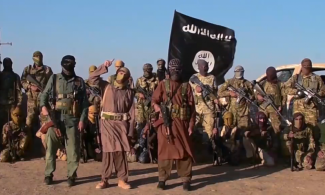
The terrorist group Ansaru discovered ways to circumvent the platforms' weak human and automated monitoring systems.
An Al-Qaeda-linked terror group in Nigeria has been caught violating social media regulations while spreading jihadi propaganda, recruiting members, and gathering sympathisers.
Despite social media companies' efforts to remove terror-related content, the terrorist group Ansaru discovered ways to circumvent the platforms' weak human and automated monitoring systems.
They have had the freedom to gather audiences and create a false image of themselves by using local languages to push themselves on potential recruits through propaganda messages reaching millions of young people in the country, HumAngle reports.
Ansaru meets Facebook's definition of a terror organisation and leaked internal documents obtained by The Intercept in 2021 show that Ansaru is on the platform's watchlist of 1,050 terror organisations and violent non-state actors.
However, by simply posting their content in Hausa, they have managed to avoid detection by social media regulations to influence thousands, if not tens of thousands, of people.
Over the course of a months-long investigation, HumAngle tracked 22 accounts linked to Ansaru, which were used to spread Al-Qaeda propaganda and messages in Hausa. This demonstrates the inability of social media platforms to remove terrorist content.
The platform has also evolved into a venue for Ansaru Jihadists to announce the launch of their public and private Whatsapp and Telegram channels, where they share more violent content.
They also use the platforms to recruit new members by engaging them in Q&A sessions and weeding out undesirables before forwarding successful applicants to a hardline jihadi group.
Ansaru members on social media announce backup accounts with similar or different names to continue spreading propaganda where they suspect detection or fear the accounts will be taken down. This allows them to keep their audience even after some of their profiles have been deactivated.
Despite having multiple accounts on social media platforms like Facebook and messaging apps like Whatsapp and Telegram, Ansaru members' social media usage has shown that they are less sophisticated in evading detection than Islamic State supporters, who communicate by sending encrypted messages on closed networks.
They rely on the ineffective detection mechanisms of social media platforms and remain active on them for an extended period of time. They are not prevented from creating multiple accounts once the established accounts are detected and removed.
Ansaru members are known for their violent attacks on Nigerian forces and foreign elements, as well as their use of social media to promote their agenda. They are primarily active in the Northwest and North-central parts of the country.
Ansaru, which split from the Abubakar Shekau-led Boko Haram group in 2012, has been less violent than other jihadi factions in Nigeria. It has recently increased its efforts to spread propaganda and misinformation, taking advantage of people's grievances in less secure areas.
Members of Ansaru have gained a small amount of clout in remote rural communities in the Northwest and North Central, where they conduct door-to-door propaganda campaigns and seek to impose their interpretation of Shari'a law. Residents claim that Ansaru members preach anti-democracy sermons and coerce families into forcing their daughters into marriages, after which the women are taken to forest camps to become Jihadi brides.